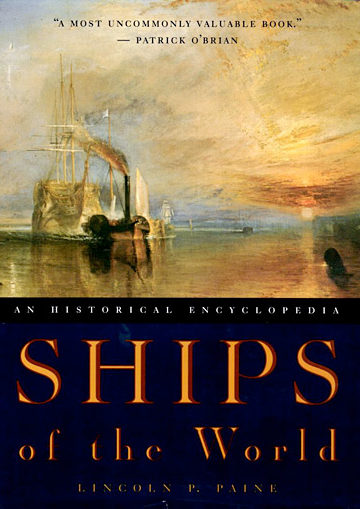
- Available in: Hardcover, Paperback
- ISBN: 0395715563
- Published: November 1, 1997
An Historical Encyclopedia
You don’t have to be a maritime historian—or even a sailor—to find Lincoln Paine’s Ships of the World fascinating. As the Library Journal noted, this comprehensive and very readable encyclopedia was “clearly the most fascinating book of the year.” Certainly no scholar or student of the history of ships will want to be without this compendium of the life stories of more than a thousand of the world’s best-known and most significant vessels of every size and type and every time period as far back as ancient Egypt.
Paine’s flair for language and the skill with which he has made his selections make’s Ships of the World a browser’s delight—more like a short-story collection than an authoritative encyclopedia. Look up an entry on any celebrated vessel–the Titanic, the Monitor, the Lusitania—and you’ll find an admirably concise history of the boat and the events that made it famous. But browsing turns up countless unexpected pleasures, from the story of the Politician (a freighter that ran aground in the Outer Hebrides, where its cargo of Scotch was efficiently plundered by locals) to that of Jacques Cousteau’s Calypso. The hundreds of well-chosen black-and-white illustrations help bring the tales alive.
Each ship is described in a vivid short essay that captures its personality as well as its physical characteristics, construction, and history, from the drawing board to the scrap yard or museum. In the words of Patrick O’Brian, “Ships of the World: An Historical Encyclopedia contains the intelligent distillation of the essence of hundreds upon hundreds of well-chosen books.” Even fictional ships and boats like Humphrey Bogart’s African Queen and Jack Aubrey and Stephen Maturin’s HMS Surprise are included.
Two hundred illustrations show the grandeur and grace of oceangoing vessels, maps help the reader follow the tracks of the great seafarers and naval campaigns, and timelines offer a chronological perspective on archaeological sites, naval warfare, technology, exploration, and disasters at sea. Ships of the World is not only an invaluable reference but fascinating reading for anyone who has the slightest interest in history or who simply likes messing about in boats, whether on the water or from a comfortable chair at home.
And poring over its pages will make it clear how it proved to be the inspiration for Paine’s award-winning The Sea and Civilization: A Maritime History of the World.